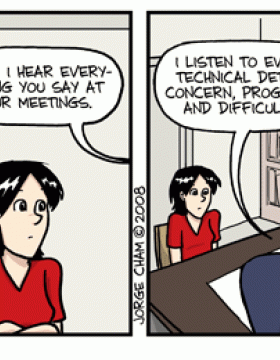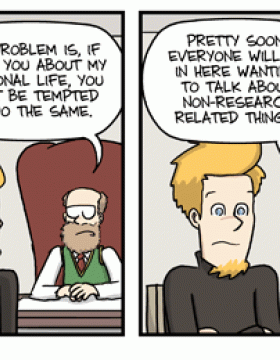Communicate More Effectively
Career Wise Menu
Understand Communication Elements: Overview
Effective communication is a dynamic and active process—one that calls on you to juggle multiple factors at once to achieve your objectives. The outcomes of a specific interaction involve you, of course, but are also a function of the other person, the relationship between the two of you, and the message itself. Often overlooked are the context of the interaction and how gender and other intersecting identities may affect how you send messages and how they are received. The Understanding Communication Elements modules address each of these.

The You in Communication
Communication starts with you. You choose what words you say and to whom you say them, and you control your nonverbal communication. You also shape the communication process through how you listen to others, whether you are listening actively or passively. You bring “you” to every conversation and interaction, and…
Learn more
The Other in Communication
Communication is not one-sided—it is a two-way process between you and another person. You can communicate your message assertively and effectively, but there is no guarantee that the other person will understand what you have to say or agree with your requests. But, you can learn to understand the other person…
Learn more
The Message in Communication
The message you send comprises more than the words you choose. How you say the words, when and how you deliver the message, your nonverbal cues, and how you handle interferences all contribute to whether your message conveys and elicits what you intended. This module will help you learn to be mindful about what you…
Learn more
Gender in Communication
For women in a male-dominated field, gender is an unavoidable and important factor in communication processes. Gender dynamics shape how messages are both presented and interpreted. Becoming more aware of how the social expectations for women and men affect communication will help you be more effective in reaching…
Learn more
The Context in Communication
The environment in which you communicate and its associated norms, along with circumstances surrounding your interactions, contribute significantly to your experience of fit with your program and discipline. Recognizing how context influences how you are perceived and understood by others and learning to navigate…
Learn more
The Outcome in Communication
The outcome often refers to the end-point of an interpersonal exchange. Identifying in advance what you want to achieve from a particular interaction can help guide you in the communication process. Whether you are pursuing one objective or many, obtaining a desirable communication outcome will require…
Learn more
The Relationship in Communication
In both personal and professional spheres, interpersonal communication is often about building and sustaining a relationship as much as conveying the content of a message. Maintaining strong working relationships with faculty members and peers is crucial to academic and career success. Similarly, upholding healthy…
Learn moreCommunicate Effectively
“Our first responsibility as effective listeners is to understand ourselves as communicators. Just as the sources of the communication message should be trained in self-intrapersonal communication, so, too, should listeners know themselves.”
“Any problem, big or small, always seems to start with bad communication. Someone isn't listening.”
An Arizona State University project, supported by the National Science Foundation under grants 0634519, 0910384 and 1761278
Any opinions, findings, and conclusions or recommendations expressed in this material are those of the authors and do not necessarily reflect the views of the National Science Foundation. © 2021 CareerWISE. All rights reserved. Privacy | Legal


